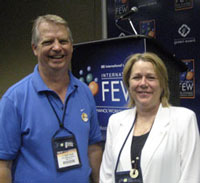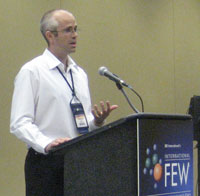DuPont is dropping $58 million into a joint venture with British Petroleum (BP) and British Sugar to produce the biofuels, biobutanol and ethanol. Biobutanol is a renewable energy source similar to ethanol in that its is obtained by fermenting some of the same feedstocks, but biobutanol is closer to unleaded gasoline in energy content. It is also more compatible with existing pertoleum-based fuels pipeline systems.
The company will build a biobutanol demonstration plant, the first of its kind in the world, with BP and a 420 million liter (about 100 million gallons) a year ethanol plant with British Sugar. Both facilities will be at Saltend, Hull, about 200 miles north of London.
This DuPont news release says DuPont and BP will start to send market development quantities of biobutanol to the U.K. by the end of the year tp test the manufacturing infrastructure and for vehicle testing:
“Our strategy is to selectively invest in production facilities globally to meet the demand for biofuels. Today marks the first two investments of this nature,” said DuPont Executive Vice President and Chief Innovation Officer Thomas M. Connelly. “We are on track to deliver on the milestones announced in 2006 for biobutanol, specifically market development of biobutanol by the end of this year and introduction of our second-generation technology by 2010.”
The biobutanol technology research and demonstration facility will make the biofuel from wheat, corn, barley and rye starting in early 2009. In the last year-and-a-half, DuPont has doubled the number of scientists working on biobutanol R&D and has filed more than 30 patents related to the biofuel.


 To celebrate independence from foreign oil on Independence Day, MFA Oil Company – which currently sells E85 at more than 40 locations in Arkansas, Iowa and Missouri – will be giving away a Ford F-150 FFV for the second year in a row.
To celebrate independence from foreign oil on Independence Day, MFA Oil Company – which currently sells E85 at more than 40 locations in Arkansas, Iowa and Missouri – will be giving away a Ford F-150 FFV for the second year in a row.  “Our goal is to help educate consumers so that E85 becomes their fuel of choice,” said Jerry Taylor, president of MFA Oil Company. “In doing so, we continue to demonstrate MFA Oil’s commitment to strengthening rural economies through support of the biofuel industry and by decreasing our dependence on foreign oil.”
“Our goal is to help educate consumers so that E85 becomes their fuel of choice,” said Jerry Taylor, president of MFA Oil Company. “In doing so, we continue to demonstrate MFA Oil’s commitment to strengthening rural economies through support of the biofuel industry and by decreasing our dependence on foreign oil.”  Roughly half of the cattle and hog operations in a 12-state region either fed ethanol co-products or considered feeding them to their livestock last year, according to a
Roughly half of the cattle and hog operations in a 12-state region either fed ethanol co-products or considered feeding them to their livestock last year, according to a  According to Dan Kerestes, chief of the USDA NASS Livestock Branch, USDA contacted some 94-hundred dairy cattle, cattle on feed, beef cattle and hog operations in 12 states. Kerestes says USDA didn’t have too many expectations going into the report – but he says the percentage of operations already feeding co-products was a surprise.
According to Dan Kerestes, chief of the USDA NASS Livestock Branch, USDA contacted some 94-hundred dairy cattle, cattle on feed, beef cattle and hog operations in 12 states. Kerestes says USDA didn’t have too many expectations going into the report – but he says the percentage of operations already feeding co-products was a surprise. Great thing about going to meetings is getting to meet people you only know by email. I got to meet a couple of fellow bloggers at the Fuel Ethanol Workshop in St. Louis.
Great thing about going to meetings is getting to meet people you only know by email. I got to meet a couple of fellow bloggers at the Fuel Ethanol Workshop in St. Louis.  I also met Nathan Schock with
I also met Nathan Schock with  Thanks to the
Thanks to the  Many of the exhibitors at the 2007 Fuel Ethanol Workshop were offering new technology and equipment to make ethanol production better, faster, easier, more efficient – you name it.
Many of the exhibitors at the 2007 Fuel Ethanol Workshop were offering new technology and equipment to make ethanol production better, faster, easier, more efficient – you name it.  According to their website, BetaTec is the new application arm of the Barth-Haas Group. The Barth-Haas Group was founded in 1794 and is the oldest and largest hops company in the world. As part of the Barth-Haas Group, BetaTec draws on over 200 years of hop experience and our vertically integrated operations which include every aspect of hops…growing, harvesting, processing, marketing, distribution and sales. We know hops!
According to their website, BetaTec is the new application arm of the Barth-Haas Group. The Barth-Haas Group was founded in 1794 and is the oldest and largest hops company in the world. As part of the Barth-Haas Group, BetaTec draws on over 200 years of hop experience and our vertically integrated operations which include every aspect of hops…growing, harvesting, processing, marketing, distribution and sales. We know hops! The growth of the ethanol industry was most obvious at the 2007 Fuel Ethanol Workshop last week in St. Louis on the expo floor. Some 700 exhibitors were there, an increase of 60 percent from last year alone.
The growth of the ethanol industry was most obvious at the 2007 Fuel Ethanol Workshop last week in St. Louis on the expo floor. Some 700 exhibitors were there, an increase of 60 percent from last year alone.  There’s a new player on the block in the alternative energy group sector: The American Biofuels Council.
There’s a new player on the block in the alternative energy group sector: The American Biofuels Council.